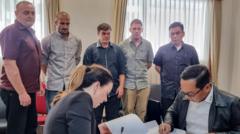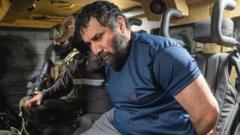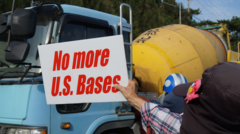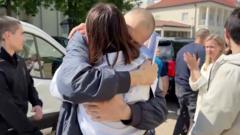After serving significant prison sentences in Indonesia for drug smuggling, the five surviving members of the Bali Nine are now back in Australia. Their return followed a long campaign for their repatriation, reflecting complexity in Australia's relationship with Indonesia regarding drug laws.
Bali Nine Drug Traffickers Return to Australia After Two Decades in Prison

Bali Nine Drug Traffickers Return to Australia After Two Decades in Prison
The five remaining members of the Bali Nine drug trafficking group express relief upon returning to Australia after nearly 20 years of incarceration in Indonesia.
In a long-awaited return, the five remaining members of the notorious "Bali Nine" drug smuggling group arrived in Australia after serving nearly two decades in Indonesian prisons. Matthew Norman, Scott Rush, Martin Stephens, Si Yi Chen, and Michael Czugaj expressed their relief and happiness at being back home. Their return marks a significant moment in a case that has drawn international attention since it began in 2005 when they, along with other members, attempted to smuggle 8.3kg of heroin out of Bali.
The group's arrest, initiated by a tip-off from Australian authorities, led to a high-profile trial and a stark examination of Indonesia's tough drug laws. The fate of the nine young Australians became even more critical when two of the group's leaders, Andrew Chan and Myuran Sukumaran, were executed by firing squad in 2015, igniting a diplomatic spat between Australia and Indonesia.
Of the initial group, while Renae Lawrence, the only woman, was released after her sentence was commuted following almost 13 years in prison, the remaining members faced lengthy terms with no reprieve. Now aged between 38 and 48, they were flown back to Australia as prisoners but, according to local reports, will lead unhindered lives in their home country.
Prime Minister Anthony Albanese acknowledged the seriousness of their offenses but underlined the importance of their repatriation, commending Indonesian President Prabowo Subianto for his "act of compassion". The families of the Bali Nine expressed deep gratitude to various advocates who had campaigned on their behalf for many years, requesting privacy as they reintegrate into society.
The return of these individuals has renewed discussions around Indonesia's strict drug laws and the ramifications they have on international relations, particularly between Australia and its neighbor. As they embark on a new chapter, the focus will now shift toward supporting their adjustment back into Australian society, with many hoping the community will allow them the time and space needed for this transition.
The group's arrest, initiated by a tip-off from Australian authorities, led to a high-profile trial and a stark examination of Indonesia's tough drug laws. The fate of the nine young Australians became even more critical when two of the group's leaders, Andrew Chan and Myuran Sukumaran, were executed by firing squad in 2015, igniting a diplomatic spat between Australia and Indonesia.
Of the initial group, while Renae Lawrence, the only woman, was released after her sentence was commuted following almost 13 years in prison, the remaining members faced lengthy terms with no reprieve. Now aged between 38 and 48, they were flown back to Australia as prisoners but, according to local reports, will lead unhindered lives in their home country.
Prime Minister Anthony Albanese acknowledged the seriousness of their offenses but underlined the importance of their repatriation, commending Indonesian President Prabowo Subianto for his "act of compassion". The families of the Bali Nine expressed deep gratitude to various advocates who had campaigned on their behalf for many years, requesting privacy as they reintegrate into society.
The return of these individuals has renewed discussions around Indonesia's strict drug laws and the ramifications they have on international relations, particularly between Australia and its neighbor. As they embark on a new chapter, the focus will now shift toward supporting their adjustment back into Australian society, with many hoping the community will allow them the time and space needed for this transition.




















